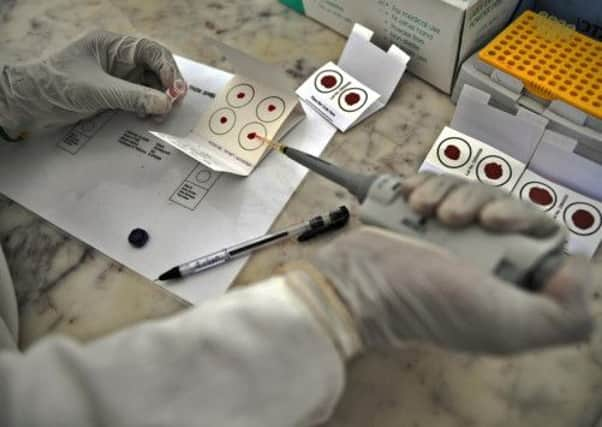Scientist jailed for faking research data


Steven Eaton, 47, was jailed for the maximum three months at Edinburgh Sheriff Court for falsifying test results on medicine which medics hoped could be used to treat the life threatening illness.
Sheriff Michael O’Grady QC said his sentencing powers were “wholly inadequate” and told Eaton he could have caused cancer patients “unquestionable harm”.
Advertisement
Hide AdAdvertisement
Hide AdThe Medicines and Healthcare Products Regulatory Agency said several new medicines had been significantly delayed, including one to treat depression.
Scam
The court had earlier heard how the researcher was working at the Edinburgh branch of US-based pharmaceutical firm Aptuit in 2009 when he came up with the scam.
Eaton was hoping to generate funding which would allow the drug he was working on to be treated on humans.
So he concocted information about the medicine that would persuade Aptuit to allow the drug to be treated on real life patients.
The court heard that if the scam had been successful, Eaton could have harmed the health of cancer patients who took the experimental drug.
However, executives at the firm became suspicious about what he was doing and reported him to the MHPRA.
Selective reporting
Investigators there discovered that Eaton had been selectively reporting research data since 2003.
Details of the case emerged after Eaton, from Cambridgeshire, was convicted last month under the 1999 Good Laboratory Practice Regulations.
Advertisement
Hide AdAdvertisement
Hide AdSentence had been deferred so the court could obtain reports about his character.
Eaton is only the second person in the UK to be prosecuted under the law, but is the first to be convicted.
Passing sentence, Sheriff O’Grady said under the terms of the legislation, a prison term of three months was the longest sentence that Eaton could be given.
Sheriff O’Grady said: “I feel that my sentencing powers in this are wholly inadequate.
“You failed to test the drugs properly - you could have caused cancer patients unquestionable harm.”
At the earlier hearing, the court heard how Eaton had manipulated the results of experiments he carried out at his laboratory in the firm.
Manipulation
His manipulation ensured an experiment was deemed successful when it had actually failed.
When managers at his firm scrutinised his work, they noticed it was fraudulent and were forced to stop work on the project on which Eaton was working.
Advertisement
Hide AdAdvertisement
Hide AdThe court heard that if Eaton’s work had passed undetected, patients could have been given the drug and been exposed to an increased risk that the substance was unsafe.
Today, defence solicitor advocate Jim Stephenson told the court that at the time of the offence, his client had been working in a stressful environment.
Mr Stephenson said: “He appreciates that custody could be an option in this case.
“At the time of the offence he was under a lot of pressure. He was working long hours. There were also issues in his personal life.
“Mr Eaton did not benefit financially from this. At the time of the offence, he was making £32,000 per year. “
‘Disturbing’
Mr Stephenson said the social worker who wrote the report about Eaton’s background thought the scientist was at low risk of re-offending.
Mr Stephenson asked Sheriff Michael O’Grady QC: “I would urge your lordship to consider a non custodial disposal.”
However, Sheriff O’Grady told Eaton that he had no other choice but to impose a custodial sentence on him.
Advertisement
Hide AdAdvertisement
Hide AdBefore sending him to prison, Sheriff O’Grady also said he found the case “disturbing”.
He said: “Why someone who is as highly educated and as experienced as you would embark on such a course of conduct is inexplicable.”
Speaking after the case, Gerald Heddell, the MHPRA’s director of inspection, enforcement and standards, said: “This conviction sends a message that we will not hesitate to prosecute those whose actions have the potential to harm public health.
“[Mr] Eaton’s actions directly impacted on the validity of clinical trials and delayed a number of medicines coming to market, including one to treat depression.”
The MHPRA said Aptuit had identified “serious irregularities” in data collected to support clinical trials on humans.
It involved false data that would have been used to determine the concentration of medicine given to people during trials to assess its safety and effectiveness.
The agency said the discovery led to hundreds of safety studies about the impact of data manipulation being reviewed.
A spokesman said: “As a result of [Mr] Eaton’s actions, the development of a number of new medicines were significantly delayed and considerable cost to the study sponsors was incurred as a result of the delay.
Advertisement
Hide AdAdvertisement
Hide AdPatients groups applauded the sentence in helping restore trust in medical research.
Scotland Patients Association executive director Dr Jean Turner said: “We depend on research to be as truthful as it can be. If someone has been proved to have deliberately falsifed it, that is fraud, and people’s lives might have been affected.
“Once trust has gone, it’s really very difficult to restore. See what happened with MMR - a lot of people lost faith [because of discredited research] and we now have a measles outbreak in Wales.”